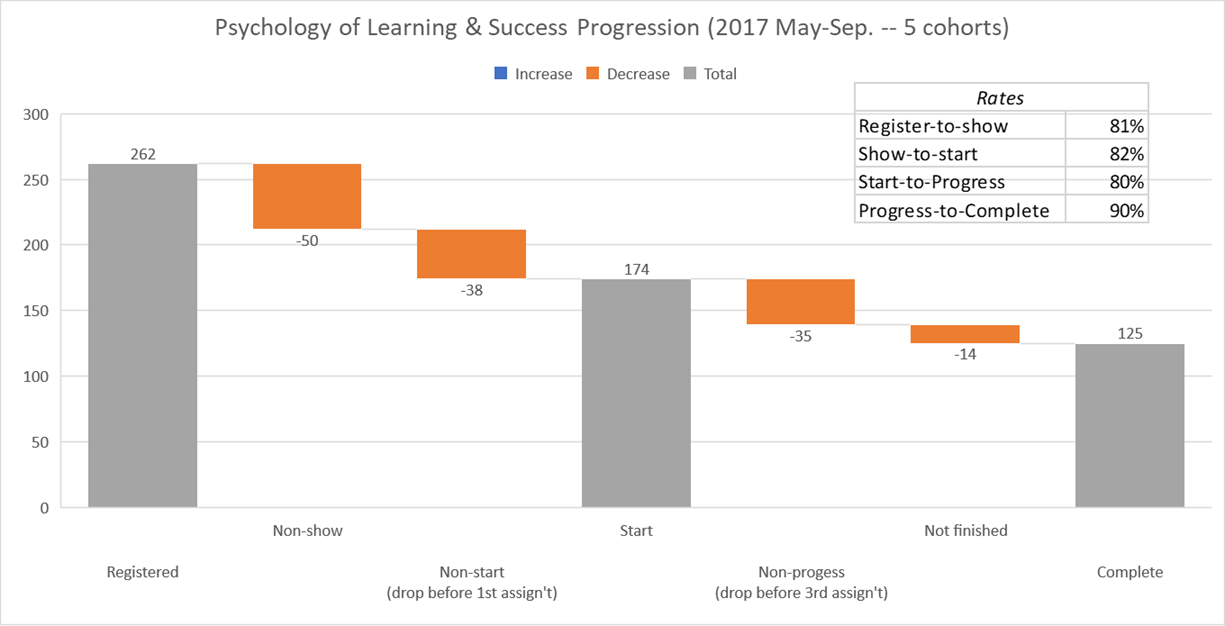Published on
How Raising the Bar Helps Re-Entry Students Succeed (Part 2)

This series discusses the results of the Pacific Crest Online Recovery Course, exploring how to help students who are returning to postsecondary education learn to learn.
The Transformation
Every student who completed the course (184) stated the course was valuable. More telling, most of the students described the impact as, in effect, transformational. The following tables’ excerpts represent comments taken from the 34 self-growth papers by students in the September 2017 offering. The comments illustrate the profound impacts of the experience.
Initial Mindset
The incoming mindset was one of surprise and frustration shared by all students.
- “I thought it was going to be a piece of cake… able to put minimal effort in and breeze through everything”
- “I must admit, I didn’t expect to grow a single bit as a person.”
- “…having this class required of me was like another punch to knock me down some more.”
- “I viewed the course as a necessary evil; one that was assigned by the University as fluff and could be easily dismissed.”
- “…as far as I saw it, the course seemed to be a huge obstacle standing in the way of my goal.”
Final Mindset
The results were far different and describe the transformation that occurs during the course.
Life Vision
- “I feel I have grown as a person in that I more clearly understand who I am, why I am where I am at, and what I want out of the rest of my life.”
- “I feel like a different person sitting here today… The one thing that became more and more apparent to me as the class progressed was the vision that I had for my life.”
- “I was not prepared for the personal, eye-opening experience this course has been. It has made me look at who I think I am, who I want to be and what it is going to take to get there.”
- “What I didn’t expect was the in-depth look at myself and how my experiences have shaped me, or the ambition to go out and learn new things I’ve been putting off my entire life.”
Growth Mindset
- “This class has given me tools I didn’t expect that will help me achieve these goals, and any others I set for myself. An unintended tool I learned from this class was how to overcome failure, finding success in failure.”
- “What I have learned about facilitating self-growth is that it takes hard work, dedication and persistence to (1) want to grow and (2) to continue to use it as a practice in every day. With every distraction, there’s a tool to overcome it, with every success there’s another milestone to complete and with every failure, there is a success story to follow.”
Self-assessment
- “I have additionally learned to Self-Assess rather than Self-Evaluate, which is extremely important because you cannot learn from mistakes when all you do is criticize and beat yourself up over them.”
- “Here was a roadmap that I could use to identify my skills that were weak and gave examples of applications and how to improve them, which would help me build my identity as a student that much faster.”
Handling Life’s Challenges
- “What I didn’t expect was to learn how to build those skills through self-assessment and gain a greater confidence in myself and my ability to work through challenges …as I started this course I was thrown into the middle of an unexpected divorce, a move that wasn’t planned for, and a new job.”
- “I was not prepared for the amount of critical thinking and reflecting on myself that was going to happen in this course. … [resulting in] being extremely aware of myself and my failures and what I can and have done to improve and grow.”
Positive Outlook
- “This course was tough. But it was a huge asset to me. What this course has taught me will follow me throughout my educational life, my professional life, and my personal life.”
- “I grew in my being able to look at myself and my issues honestly, placing blame where it belonged. A part of my personality that has been sleeping for a long time has been reawakened: my love of learning and my strong desire to do well in school.”
- “I learned to be more proactive and present with my feelings towards finishing school instead of being as pessimistic.”
- “I have grown as a learner when it comes to assessing myself. But what I was not expecting was learning how to be more positive towards my ability to finish school.”
Summary of the Change
Rather than just another student success course, this course transformed students with a negative perception of self and school into self-confident, and able students committed to succeed.
Over 90 percent of students who desire to pass Psychology of Learning and Success will build their learner performance to a collegiate level (Profile of a Quality Collegiate Learner) and pass the course, while 34 percent of students registering will self-select that they aren’t willing to do what it takes to become college ready.
Implementation
The Psychology of Learning and Success is the name of the course that Pacific Crest built, tested, assessed, and revised each month for five consecutive months before providing it to the university to implement on its own. It is a four-week intensive online course consisting of 15 discrete learning experiences, each of which has its basis in the book by Apple, Morgan, & Hintze, Learning to Learn — Becoming a Self-Grower (2013).
Students registering for the course each month are placed into cohorts of approximately 50 to 75 students. Additionally, they are assigned a neighborhood (work group/team) so they can collaborate and help each other. During the course, they experience a variety of challenges and tasks, posting their work publicly (on course forums) as well as more privately (submitting assignments that are only seen by their course facilitator). There are a variety of benchmarks and deadlines throughout the course, all of which have the sole purpose of helping students improve their time management skills.
The course capstone is a self-growth paper through which students explore and measure the degree of growth they experienced during the course. This is distinct from what they have learned; growth is concerned with their capacity to not only perform but improve their academic performance.
The following list offers an outline of how each experience contributes to meeting these far-reaching learning outcomes:
Experience (Application to Students’ Personal and Professional Lives)
- Performing Like a Star: Performance analysis of self as collegiate learner from exiting term
- Becoming a Master Learner: Learning something new, professionally or personally; application of the Learning Process Methodology
- Your Past Doesn’t Define Your Future: Processing past life experiences (personal, professional, academic) to leverage these experiences for future success
- Self-Assessment: The Engine of Self-Growth Turning evaluation into assessment (five examples); focuses on shifting mindset from self-evaluation to self-assessment; students explore assessment in a variety of contexts
- Time, Planning, and Productivity: Planning out a term; making a time schedule to carve out 20 to 25 hours per week for working on courses
- Methodologies: Unlocking Process Knowledge Solving a problem; use the Problem-Solving Methodology to tackle an existing professional or personal problem
- Visioning Your Future: Exploring the university’s resources and developing future plans on how to use them effectively
- Performing in Teams and within a Community: Building a concrete proposal for supporting future students by recommending changes in the Introduction Session (used by themselves)
- Performing when Being Evaluated: Apply the Preparation Methodology to a real-life situation; preparing for a performance
- Reading for Learning: Applying the Reading Log to something in their professional lives
- Metacognition: Thinking about My Thinking Elevating their learning; importance of critical thinking and seeing how their learning has improved, use meta-cognition prompts to analyze something they have learned in their personal or professional lives
- Using Failure as a Stepping Stone for Success: Applying the Personal Development Methodology to something in their lives
- Choosing and Using Mentors Effectively: Plan how to use a mentor; helps to show power of structured mentoring processes and overlaying of additional mentors
- My Turn to Shine: Analyzing personal reactions and then synthesizing to produce action plans for changing reactions in personal and professional contexts
- Shifting from Extrinsic to Intrinsic Motivation: Personal value analysis; explores how current values align with existing life situations and choice of vocation
This was the second of four installments in Leasure and Apple’s series on the Pacific Crest Online Recovery Course. In the third installment, they will discuss some of the lessons learned during the course of this study. For more details on the project, you can download the project report here.
Previous Article:
How Raising the Bar Helps Re-Entry Students Succeed (Part 1)
Author Perspective: Analyst




